Related Research Articles
Robert Wilfred Levick Simpson was an English composer, as well as a long-serving BBC producer and broadcaster.
A suite, in Western classical music and jazz, is an ordered set of instrumental or orchestral/concert band pieces. It originated in the late 14th century as a pairing of dance tunes and grew in scope to comprise up to five dances, sometimes with a prelude, by the early 17th century. The separate movements were often thematically and tonally linked. The term can also be used to refer to similar forms in other musical traditions, such as the Turkish fasıl and the Arab nuubaat.

The six Cello Suites, BWV 1007–1012, are suites for unaccompanied cello by Johann Sebastian Bach. They are some of the most frequently performed and recognizable solo compositions ever written for cello. Bach most likely composed them during the period 1717–23, when he served as Kapellmeister in Köthen. The title given on the cover of the Anna Magdalena Bach manuscript was Suites à Violoncello Solo senza Basso.

Dame Elizabeth Violet Maconchy LeFanu was an Irish-English composer.
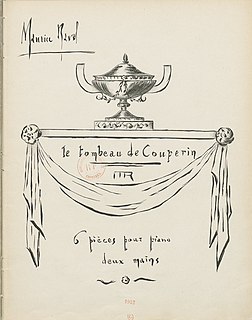
Le Tombeau de Couperin is a suite for solo piano by Maurice Ravel, composed between 1914 and 1917. The piece is in six movements, based on those of a traditional Baroque suite. Each movement is dedicated to the memory of a friend of the composer who had died fighting in World War I. Ravel also produced an orchestral version of the work in 1919, although this omitted two of the original movements.
Gordon Percival Septimus Jacob CBE was an English composer and teacher. He was a professor at the Royal College of Music in London from 1924 until his retirement in 1966, and published four books and many articles about music. As a composer he was prolific: the list of his works totals more than 700, mostly compositions of his own, but a substantial minority of orchestrations and arrangements of other composers' works. Those whose music he orchestrated range from William Byrd to Edward Elgar to Noël Coward.
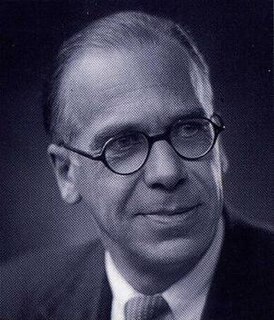
William Alwyn, , was an English composer, conductor, and music teacher.
The Piano Concerto, Op. 38, by Samuel Barber was commissioned by the music publishing company G. Schirmer Inc. in honor of the centenary of their founding. The premiere was on September 24, 1962, in the opening festivities of Philharmonic Hall, now David Geffen Hall, the first hall built at Lincoln Center for the Performing Arts in Manhattan, with John Browning as soloist with the Boston Symphony Orchestra conducted by Erich Leinsdorf.
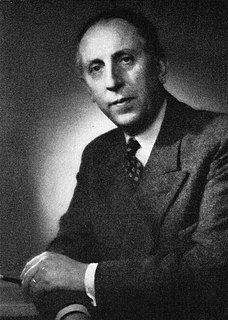
Hilding Constantin Rosenberg was a Swedish composer and conductor. He is commonly regarded as the first Swedish modernist composer, and one of the most influential figures in 20th-century classical music in Sweden.
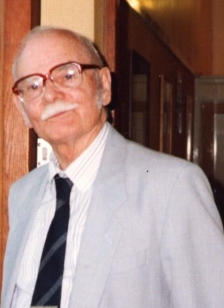
Ian Parrott was a prolific Anglo-Welsh composer and writer on music. His distinctions included the first prize of the Royal Philharmonic Society for his symphonic poem Luxor, and commissions by the BBC and Yale University, and for many leading British musicians. In 1958 his cor anglais concerto was first performed at Cheltenham Festival, and in 1963 his cello concerto was given by William Pleeth and the Hallé Orchestra – both concertos were conducted by Sir John Barbirolli.
Paul William Whear was an American composer, music educator, double-bassist, and conductor.
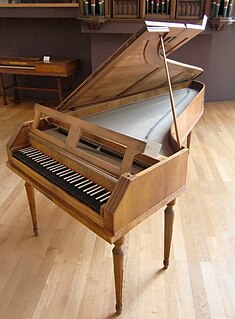
Mozart's Piano Concerto No. 11 in F major, K. 413, was the second of the group of three early concertos he wrote when in Vienna, in the autumn of 1782. It was the first full concerto he wrote for the subscription concerts he gave in the city. The autograph is held by the Jagiellońska Library, Kraków with an additional, now incomplete, copy that Mozart brought to Salzburg in 1783, in the library of the Archabbey of St Peter's, Salzburg. The concerto is in the usual three movements:
- Allegro in 3
4 - Larghetto in 4
4 - Tempo di menuetto in 3
4
Orchestral Suite No. 1 in D minor is an orchestral suite, Op. 43, written by Pyotr Ilyich Tchaikovsky in 1878 and 1879. It was premiered on December 20, 1879 at a Russian Musical Society concert in Moscow, conducted by Nikolai Rubinstein. The piece is dedicated to Tchaikovsky's patroness, Nadezhda von Meck.
Alan Shulman was an American composer and cellist. He wrote a considerable amount of symphonic music, chamber music, and jazz music. Trumpeter Eddie Bailey said, "Alan had the greatest ear of any musician I ever came across. He had better than perfect pitch. I've simply never met anyone like him." Some of his more well known works include his 1940 Neo-Classical Theme and Variations for Viola and Piano and his A Laurentian Overture, which was premiered by the New York Philharmonic in 1952 under the baton of Guido Cantelli. Also of note is his 1948 Concerto for Cello and Orchestra which was also premiered by the New York Philharmonic with cellist Leonard Rose and conductor Dmitri Mitropoulos. Many of Shulman's works have been recorded, and the violinist Jascha Heifetz and jazz clarinetist Artie Shaw have been particular exponents of his work both in performance and on recordings.
The Severn Suite, Opus 87, is a musical work written by Sir Edward Elgar. It is a late composition, written in 1930, the result of an invitation to write a test piece for the National Brass Band Championship. It was dedicated to his friend, the author and critic George Bernard Shaw.

The Water Music is a collection of orchestral movements, often published as three suites, composed by George Frideric Handel. It premiered on 17 July 1717, in response to King George I's request for a concert on the River Thames.

The conductor Sir Thomas Beecham made several orchestral suites from neglected music by George Frideric Handel, mostly from the composer's 42 surviving operas. The best known of the suites are The Gods Go a'Begging (1928), The Origin of Design (1932), The Faithful Shepherd (1940), Amaryllis (1944) and The Great Elopement.
A Moorside Suite (H.173) is a work for brass band by the English composer Gustav Holst. It was commissioned by the BBC and the National Brass Band Festival Committee in 1927 for the final of the 1928 National Brass Band Championships of Great Britain at Crystal Palace. The suite comprises three movements - Scherzo, Nocturne and March.
Kenneth Anthony Wright was a British composer and conductor.
References
- ↑ A Downland Suite : Scores at the International Music Score Library Project
- 1 2 "Piano Music by John Ireland Vol. 2". April 2003. Retrieved 23 April 2012.
- 1 2 Graham, Peter (2010). "Transcribing From Brass Band To Wind Band: A Comparison Of Approaches And Methods And Subsequent Transcription Of Gypsy Dream" (PDF).Cite journal requires
|journal=(help) - ↑ Kennedy, Michael (2004). The Concise Oxford Dictionary of Music . London: Oxford University Press. pp. 832. ISBN 0198608845.
- ↑ Cook, Kenneth John (1950). The bandsman's everything within. The University of California. p. 208.
- ↑ "A Downland Suite (Ireland, John)" . Retrieved 2 January 2019.
- ↑ "National Championship of Great Britain (Crystal Palace), Sat 1st Oct 1932" . Retrieved 23 May 2015.
- ↑ "Composer of the Week". BBC. Retrieved 23 April 2012.
- ↑ Herbert, Trevor (2000). The British Brass Band: A Musical and Social History. London: Oxford University Press. p. 381. ISBN 0198166982.
- ↑ Scholes, Percy A. (2005). Music Appreciation: Its History and Technics. Kessinger Publishing. p. 424. ISBN 1417995955.
- ↑ "A Downland Suite" . Retrieved 21 April 2012.
- ↑ Blocher, Larry (1998). Teaching music through performance in band, Volume 2. GIA Publications. p. 665. ISBN 1579990282.
- ↑ "Thursday - James Jolly". BBC. Retrieved 23 April 2012.